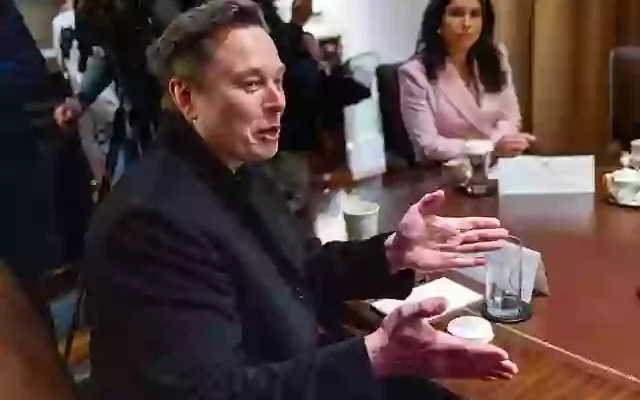A new investigation has been launched into Elon Musk regarding his billion-dollar SpaceX contracts, raising serious concerns among U.S. officials. Recently, Musk has become a controversial figure in the Trump administration, with some even labeling him the ‘crazy Uncle Elon’ due to his unconventional influence, despite not being an elected official.
The spotlight on Musk intensifies as questions grow over his alleged ‘conflicts of interest’ involving both his political connections and private ventures. Lawmakers, including Florida’s Maxwell Frost and Virginia’s Gerry Connolly, both members of the House oversight committee, are demanding documents from NASA’s chief legal officer. They want clarity on the space agency’s dealings with Musk’s companies and steps being taken to avoid conflicts. In their letter, the representatives argue that Musk holds too much power over federal decisions, calling his involvement with the Department of Government Efficiency (DOGE) a “textbook example of corruption at taxpayers’ expense.” The letter also reveals that Musk’s companies have received nearly $21 billion in federal funding since 2008, including more than $525 million in new contracts awarded to SpaceX since Donald Trump took office again.
It appears Musk’s actions are strategically aligned with the Trump administration’s push to cut back on federal staff and programs, creating an opportunity for Musk to fill these gaps with his own companies. “Musk is redirecting billions of taxpayer dollars to fund his own financial interests while slashing federal employees, programs, and services upon which all Americans depend,” the letter states, according to Axios. “At NASA, where Musk both profits from major contracts and stands to secure even more, his refusal to recuse himself from decision-making directly benefits his businesses.”
The lawmakers emphasized that these conflicts of interest are not only unethical but illegal and demand immediate attention. Musk’s ongoing control of SpaceX and his direct involvement in government projects has raised alarm over his ability to manage his own conflicts.
Despite these concerns, White House Press Secretary Karoline Leavitt maintains that Musk is complying with all applicable laws. She added that President Trump has pledged to prevent any conflicts of interest, and Musk has promised to recuse himself from situations where such conflicts may arise.
Adding fuel to the fire, The Wall Street Journal reported that Musk has been working to reshape NASA’s priorities, including reportedly helping his business associate, Jared Isaacman, secure a key role within the agency. This maneuver is said to be part of a broader strategy to shift focus from NASA’s lunar missions to Musk’s long-term plans for Mars colonization.
Elon Musk humbled after rival US firm launches 250 satellites and smashes SpaceX record
SpinLaunch has been making waves in the space community for some time now, but they may soon challenge Elon Musk’s SpaceX dominance by breaking a long-standing record with their upcoming satellite launch.
SpinLaunch has captured significant attention with its innovative approach to spacecraft technology, aiming to revolutionize the industry with its kinetic launch system. The company garnered considerable interest and investment for its efforts to launch satellites without using traditional rocket fuel. In 2022, SpinLaunch made headlines by successfully launching a NASA payload using its kinetic technology, showcasing the potential of their unconventional method.
However, the company recently made a notable shift in direction, announcing plans to enter the satellite communications market. Their next mission aims to break the current record for the largest simultaneous satellite launch—a title currently held by SpaceX. In 2021, Musk’s company launched 143 satellites in a single mission with its Transporter-1 mission. SpinLaunch, however, is aiming for an ambitious 250 micro-satellites, a feat that would overshadow SpaceX’s achievement and potentially humble Musk.
This ambitious move comes on the heels of a major contract awarded to Musk’s SpaceX by the U.S. government to launch military satellites. Musk has also suggested that SpaceX’s Starlink network could provide high-speed internet for the upcoming private space station. If SpinLaunch succeeds in its upcoming satellite launch, it could signal a major shakeup in the space sector, especially as experts predict their satellite broadband capacity could outpace existing capabilities.
SpinLaunch’s Meridian Space project would mark a transformative leap for the company. If successful, it would establish SpinLaunch as a major player in the space industry. However, there’s a twist. Despite the company’s origins in kinetic launch technology, the Meridian Space project will be powered by traditional rocket engines, which has led some to question the company’s direction.
David Wrenn, SpinLaunch’s CEO, defended the pivot, calling it a “pragmatic” decision to accelerate the satellite project’s timeline. While the kinetic launch method is still in development for future missions, it’s clear that traditional rocket technology will be the focus for now. This shift has sparked skepticism online, with some critics suggesting that the kinetic launch concept may have been flawed from the start.
“I guess the centrifugal ground launch idea wasn’t as well thought out as they hoped,” one Reddit user commented, while another speculated that SpinLaunch had quietly abandoned their original concept without fully admitting it. Others believe the company will continue using conventional rockets for satellite launches and might only revisit kinetic launches when the market is saturated with small satellite launchers.
Despite the skepticism, SpinLaunch’s plans are in motion, though their success is still uncertain. If they pull off their record-breaking launch, it could have major implications for the space industry, and might even shift the balance of power in private space ventures—potentially placing Musk’s SpaceX in a more humble position. For now, the future of SpinLaunch remains to be seen, and Musk’s record is still intact.
Elon Musk’s SpaceX awarded $5,900,000,000 contract by US government to launch military satellites into space
Elon Musk has just secured a game-changing government contract worth $5.9 billion, which will enable his aerospace company, SpaceX, to launch military satellites into space over the next four years. This major deal marks another significant milestone in SpaceX’s continued rise, following its dominance as the world’s most valuable private company. SpaceX’s growing influence is undeniable, having already collaborated with NASA and the U.S. government on several high-profile projects.
One of SpaceX’s most notable achievements came when it played a crucial role in rescuing astronauts Suni Williams and Butch Wilmore after their original Boeing spacecraft encountered technical difficulties. This success led NASA to award SpaceX a contract for the mission, cementing the company’s standing as a key player in space operations.
In addition to its work with NASA, SpaceX has also been tasked with the complex responsibility of decommissioning the International Space Station in the coming decade. Musk has even pushed to accelerate the timeline for this process, though his proposals have faced pushback from key astronauts. The expanding role of private companies in the aerospace industry continues to grow, especially as initiatives to explore and potentially mine the Moon gain momentum. SpaceX, along with other major players, has received a significant boost from the U.S. government, strengthening its foothold in this high-stakes arena.
As reported by NewsX, SpaceX was recently awarded a $5.9 billion contract to launch military satellites, alongside competitors Lockheed Martin & Boeing’s United Launch Services, which secured a $5.4 billion contract, and Jeff Bezos’ Blue Origin, which was awarded $2.4 billion. In total, 54 satellite launches are planned before 2029, with SpaceX taking the lion’s share—28 launches, or over half of the total operations.
“This ensures assured access to space for our national security missions,” stated the U.S. Space Force after the agreement, emphasizing the importance of the contract in enhancing military readiness.
The growing dominance of private companies like SpaceX in U.S. space operations has sparked debate about the future of space exploration and military readiness. However, some critics have raised concerns about Musk’s position within the U.S. government, where he heads the Department of Government Efficiency. They argue that his role could present a conflict of interest when it comes to the awarding of government contracts. While President Trump has defended Musk’s involvement, stating that Musk receives no direct financial advantages from his government role, skepticism remains over the potential influence Musk’s position could have on key decisions, especially with his impending departure from the role.
This isn’t the first time Musk’s ventures have benefitted significantly from government contracts since he assumed a position within Trump’s administration. Recently, SpaceX’s subsidiary, Starlink, was awarded a $2.4 billion air traffic control contract, a deal originally intended for Verizon, further raising eyebrows about the relationship between Musk’s companies and government dealings.
As SpaceX continues to expand its operations and influence, the impact of these government contracts on the future of space exploration and the role of private companies in national security is becoming ever more significant.
Incoming head of NASA boldly defies Elon Musk with promise to finally put humans on the Moon again
The incoming head of NASA, Jared Isaacman, has boldly promised to bring humans back to the Moon, directly contradicting Elon Musk’s views and potentially setting the stage for a clash of priorities in the space sector.
The last time humans set foot on the lunar surface was over 50 years ago during the Apollo 17 mission in December 1972. Astronauts Eugene Cernan and Harrison Schmitt were the final two to walk on the Moon. But that may soon change, as NASA ramps up its efforts to return astronauts to the lunar surface through the Artemis program.
Isaacman, who is set to become NASA’s new administrator, was questioned during a Congressional confirmation hearing on April 9. The former fighter jet pilot, who has also flown on a SpaceX mission, expressed his strong commitment to the Artemis program and stated that one of his goals is to send American astronauts to Mars in the future. He emphasized that the Artemis mission is critical for advancing both scientific and national security objectives.
“We will inevitably have the capabilities to return to the Moon and determine the scientific, economic, and national security benefits of maintaining a presence on the lunar surface,” Isaacman said, signaling a return to lunar exploration as a stepping stone for future space ambitions.
This stance contrasts sharply with the views of SpaceX CEO Elon Musk, who has called NASA’s focus on the Moon a “distraction.” Musk has long advocated for prioritizing Mars over the Moon, arguing that the current Artemis approach is inefficient and driven more by political motives than by effective space exploration. In a post on his social media platform, X (formerly Twitter), Musk criticized the Artemis program for being “a jobs-maximizing program, not a results-maximizing program,” and suggested that a new approach was needed entirely.
Despite Musk’s comments, Isaacman is firmly backing the Artemis program. He expressed his excitement about the possibility of astronauts once again walking on the Moon, stating, “I’d like nothing more than to see this Artemis 2 crew get around the Moon and then they’re back at home watching their friends walk on the Moon.” Isaacman also posed a critical question, asking, “Why has it taken so long, why has it cost so much money?”
The conversation took a geopolitical turn when Senator Ted Cruz warned that abandoning the Artemis program could have serious consequences for the United States’ standing in space exploration. He argued that such a shift would give China a significant advantage in the lunar race, calling it a “catastrophic mistake” to cede the Moon to the Chinese government.
It remains to be seen whether Isaacman’s strong support for the Artemis program will cause friction between him and Musk, given that Musk’s SpaceX has been heavily involved in NASA’s Moon and Mars missions. The conflict of priorities could define the future direction of U.S. space exploration, as private and public sector goals increasingly intersect.
Elon Musk’s SpaceX is offering free Starlink dishes worth hundreds of dollars to certain customers
SpaceX is making bold moves to expand its Starlink service globally by not only lowering prices on its internet plans but also offering free Starlink dishes in select countries.
Elon Musk’s space company continues to achieve major milestones, including becoming the most valuable private entity in the world. Recently, SpaceX secured a monumental $5.9 billion government contract to launch military satellites over the next four years. The company also played a pivotal role in the rescue of astronauts Suni Williams and Butch Wilmore after technical issues with their Boeing spacecraft, and it is set to receive another $843 million contract with NASA to decommission the International Space Station over the next decade.
While SpaceX thrives in these areas, the company is also keen to expand the reach of its satellite internet service, Starlink. In a bold move, SpaceX has begun offering Starlink dishes for free in certain markets, with Italy being one of the first countries to see this offer. In Italy, customers can now receive the standard Starlink dish, typically priced at €349, at no charge—provided they commit to a 12-month residential service plan. The message from SpaceX reads: “Get a Starlink Standard kit for 0 € 349 € in exchange for a commitment to a Residential service plan for at least 12 months.”
Similar promotions have been reported in Australia, where customers will only face fees if they cancel or modify their service, transfer their Starlink kit to another user, or fail to pay their bills. This move is part of SpaceX’s strategy to grow its customer base, which now includes over five million users across more than 120 countries.
However, this rapid expansion comes amid some challenges. Musk’s growing political involvement, particularly with his support for Trump and his role in the Department of Government Efficiency (DOGE), has raised concerns among some investors, who worry that Musk’s focus on multiple ventures—like Tesla and SpaceX—may be stretching him too thin. Meanwhile, his other companies, including Tesla, have faced declining sales, boycotts, and protests, with some critics arguing that Musk is overly distracted.
Additionally, Starlink’s expansion has faced some backlash in Canada. Reports have surfaced that Starlink installers in the country have been harassed by consumers upset about U.S.-Canada trade tensions. This comes after Ontario Premier Doug Ford canceled a $100 million contract with Musk, which has further fueled negative sentiment.
While it remains unclear if SpaceX will expand its free dish offers to other markets, residential sign-ups in major U.S. cities are currently paused due to limited network capacity. Despite the hurdles, SpaceX’s efforts to expand Starlink are still progressing, positioning the company for even greater global influence in the future.



